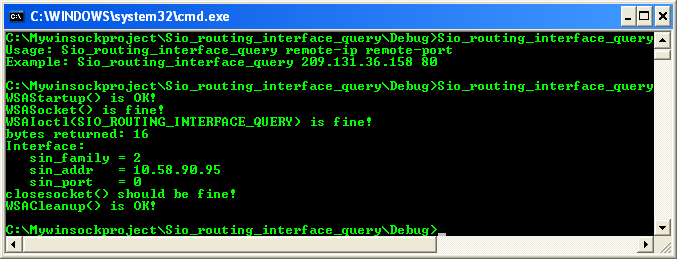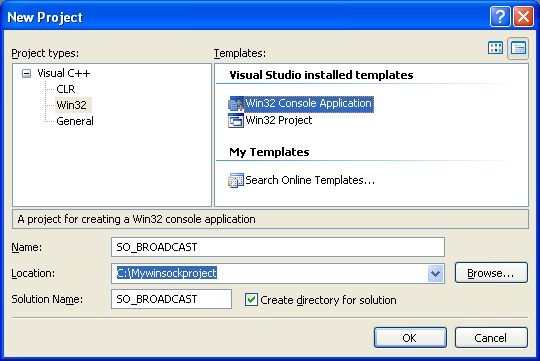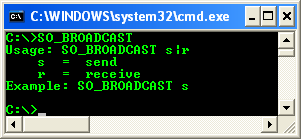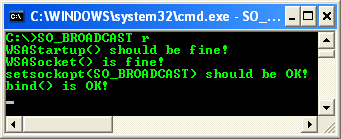< SIO_RCVALL, SIO_RCVALL_MCAST & SIO_RCVALL_IGMPMCAST Examples | Socket Options & IOCTLs Main | Some More SO Program Examples >
Socket Options and Ioctls 7 part 9
What do we have in this chapter 7 part 9?
-
Using the SIO_ROUTING_INTERFACE_QUERY Option Program Example
-
The SO_ACCEPTCONN Option Program Example
-
The Broadcast Data and SO_BROADCAST Option Program Example
|
|
Using the SIO_ROUTING_INTERFACE_QUERY Option Program Example
Create a new empty Win32 console mode application and add the project/solution name.
Add the following source code.
// Description: // This sample illustrates how to use the SIO_ROUTING_INTERFACE_QUERY // option. This takes a destination IP address and port and calls // the interface query to determine which local IP interface should // be used to transmit the data on. This is a Windows 2000 specific option. |
//
// Command Line Arguments/Parameters
// Sio_routing_interface_query Remote-IP Remote-Port
// Remote-IP Address of remote machine interested in
// Remote-Port Port of remote machine interested in
//
// Link to ws2_32.lib
#include <winsock2.h>
#include <ws2tcpip.h>
#include <stdio.h>
// Function: main
// Description:
// Load Winsock and parse the command line. Then create a
// socket and perform the routing query. Print out the route that should be taken.
int main(int argc, char **argv)
{
WSADATA wsd;
SOCKET s;
SOCKADDR_IN input, *lpIf=NULL;
DWORD dwBytesRet=0, nRet, i;
char buf[1024];
int ret;
// Parse the command line and load Winsock
if (argc != 3)
{
printf("Usage: %s remote-ip remote-port\n", argv[0]);
printf("Example: %s 209.131.36.158 80\n", argv[0]);
return -1;
}
if (WSAStartup(MAKEWORD(2,2), &wsd) != 0)
{
printf("WSAStartup() failed with error code %d\n", WSAGetLastError());
return -1;
}
else
printf("WSAStartup() is OK!\n");
// Creat a socket
s = WSASocket(AF_INET, SOCK_DGRAM, IPPROTO_UDP, NULL, 0, WSA_FLAG_OVERLAPPED);
if (s == INVALID_SOCKET)
{
printf("WSASocket() failed with error code %d\n", WSAGetLastError());
return -1;
}
else
printf("WSASocket() is fine!\n");
// Perform the query on the given IP address
input.sin_family = AF_INET;
input.sin_addr.s_addr = inet_addr(argv[1]);
input.sin_port = htons((short)atoi(argv[2]));
ret = WSAIoctl(s, SIO_ROUTING_INTERFACE_QUERY, &input, sizeof(input), buf, 1024, &dwBytesRet, NULL, NULL);
if (ret == SOCKET_ERROR)
{
printf("WSAIoctl(SIO_ROUTING_INTERFACE_QUERY) failed: %d\n", WSAGetLastError());
return -1;
}
else
printf("WSAIoctl(SIO_ROUTING_INTERFACE_QUERY) is fine!\n");
printf("bytes returned: %d\n", dwBytesRet);
nRet = dwBytesRet / sizeof(SOCKADDR_IN);
lpIf = (SOCKADDR_IN *)buf;
// Print out the interface information
for(i=0; i < nRet ;i++)
{
printf("Interface:\n sin_family = %d\n sin_addr = %s\n sin_port = %d\n", lpIf[i].sin_family, inet_ntoa(lpIf[i].sin_addr), lpIf[i].sin_port);
}
if(closesocket(s) == 0)
printf("closesocket() should be fine!\n");
else
printf("closesocket() failed with error code %d\n", WSAGetLastError());
if(WSACleanup() == 0)
printf("WSACleanup() is OK!\n");
else
printf("WSACleanup() failed with error code %d\n", WSAGetLastError());
return 0;
}
Build and run the project.

Testing the program with the following argument (IP address):
Sio_routing_interface_query 209.131.36.158 80

The SO_ACCEPTCONN Option Program Example
Create a new empty Win32 console mode application and add the project/solution name.

Add the source code.
// Description:
// This module illustrates the SO_ACCEPTCONN option to find
// out whether a socket is listening for connections.
//
// No command line arguments
//
// Link to ws2_32.lib
#include <winsock2.h>
#include <stdio.h>
// Function: main
// Description: Loads Winsock, creates a listening socket and get the state of SO_ACCEPTCONN.
int main(int argc, char **argv)
{
WSADATA wsd;
SOCKET s;
SOCKADDR_IN local;
int ret, iSize;
BOOL bOpt;
// Load Winsock
if (WSAStartup(MAKEWORD(2,2), &wsd) != 0)
{
printf("WSAStartup() failed with error code %d\n", WSAGetLastError());
return -1;
}
else
printf("WSAStartup() is OK!\n");
// Creat a socket, bind to it, and listen
s = socket(AF_INET, SOCK_STREAM, 0);
if (s == INVALID_SOCKET)
{
printf("WSASocket() failed with error code %d\n", WSAGetLastError());
return -1;
}
else
printf("WSASocket() is OK!\n");
local.sin_family = AF_INET;
local.sin_addr.s_addr = INADDR_ANY;
local.sin_port = htons(5150);
iSize = sizeof(bOpt);
ret = getsockopt(s, SOL_SOCKET, SO_ACCEPTCONN, (char *)&bOpt, &iSize);
if (ret == SOCKET_ERROR)
{
printf("getsockopt(SO_ACCEPTCONN) failed with error code %d\n", WSAGetLastError());
return -1;
}
else
printf("getsockopt(SO_ACCEPTCONN) is OK!\n");
if (bOpt == TRUE)
printf("getsockopt(SO_ACCEPTCONN) returned TRUE!\n");
else
printf("getsockopt(SO_ACCEPTCONN) returned FALSE!\n");
if (bind(s, (SOCKADDR *)&local, sizeof(local)) == SOCKET_ERROR)
{
printf("bind() failed with error code %d\n", WSAGetLastError());
return -1;
}
else
printf("bind() is OK!\n");
listen(s, 7);
// Get the option value
iSize = sizeof(bOpt);
ret = getsockopt(s, SOL_SOCKET, SO_ACCEPTCONN, (char *)&bOpt, &iSize);
if (ret == SOCKET_ERROR)
{
printf("getsockopt(SO_ACCEPTCONN) failed with error code %d\n", WSAGetLastError());
return -1;
}
if (bOpt == TRUE)
printf("getsockopt(SO_ACCEPTCONN) returned TRUE!\n");
else
printf("getsockopt(SO_ACCEPTCONN) returned FALSE!\n");
if(closesocket(s) == 0)
printf("closesocket() should be fine!\n");
else
printf("closesocket() failed with error code %d\n", WSAGetLastError());
if(WSACleanup() == 0)
printf("WSACleanup() is OK!\n");
else
printf("WSACleanup() failed with error code %d\n", WSAGetLastError());
return 0;
}
Build and run the project.
------------------------------------------------------------

The Broadcast Data and SO_BROADCASt Option Program Example
Create a new empty Win32 console mode application and add the project/solution name.

Add the following source code.
// Description:
// This sample illustrates how to send and receive
// broadcast data. The SO_BROADCASt option only needs
// to be set on the sending socket; however in reality,
// the Microsoft provider's don't check to see if the
// option is set. In other words you could send data
// to INADDR_BROADCAST without the option set and no error would occur.
//
// Command line arguments
// SO_BROADCAST s|r
// s Send broadcast data
// r Receive data
//
// Link to ws2_32.lib
#include <winsock2.h>
#include <ws2tcpip.h>
#include <stdio.h>
// Function: main
// Description:
// The main function does everything: loads the Winsock library,
// parses the arguments, sets the broadcast option, and either
// sends or receives data depending on the command line options.
int main(int argc, char **argv)
{
WSADATA wsd;
SOCKET s;
SOCKADDR_IN to;
int ret, fromsz;
BOOL bOpt,bSender;
char *msg="This is a test string from sender", rcvbuf[1024];
// Check for arguments
if (argc != 2)
{
printf("Usage: %s s|r\n", argv[0]);
printf(" s = send\n");
printf(" r = receive\n");
printf("Example: %s s\n", argv[0]);
return -1;
}
if (tolower(argv[1][0]) == 's')
bSender = TRUE;
else
bSender = FALSE;
// Load Winsock
if (WSAStartup(MAKEWORD(2,2), &wsd) != 0)
{
printf("WSAStartup() failed with error code %d\n", WSAGetLastError());
return -1;
}
else
printf("WSAStartup() should be fine!\n");
// Create a UDP socket
s = WSASocket(AF_INET, SOCK_DGRAM, IPPROTO_UDP, NULL, 0, WSA_FLAG_OVERLAPPED);
if (s == INVALID_SOCKET)
{
printf("WSASocket() failed with error code %d\n", WSAGetLastError());
return -1;
}
else
printf("WSASocket() is fine!\n");
// Set the broadcast option (really only necessary for the sender
bOpt = TRUE;
ret = setsockopt(s, SOL_SOCKET, SO_BROADCAST, (char *)&bOpt, sizeof(bOpt));
if (ret == SOCKET_ERROR)
{
printf("setsockopt(SO_BROADCAST) failed with error code %d\n", WSAGetLastError());
return -1;
}
else
printf("setsockopt(SO_BROADCAST) should be OK!\n");
if (bSender)
{
// Send some data
to.sin_family = AF_INET;
to.sin_addr.s_addr = htonl(INADDR_BROADCAST);
to.sin_port = htons(5150);
ret = sendto(s, msg, strlen(msg), 0, (SOCKADDR *)&to, sizeof(to));
if (ret == SOCKET_ERROR)
{
printf("sendto() failed with error code %d\n", WSAGetLastError());
return -1;
}
else
printf("sendto() is OK!\n");
}
else
{
// Receive data so we must bind first
to.sin_family = AF_INET;
to.sin_addr.s_addr = htonl(INADDR_ANY);
to.sin_port = htons(5150);
ret = bind(s, (SOCKADDR *)&to, sizeof(to));
if (ret == SOCKET_ERROR)
{
printf("bind() failed with error code %d\n", WSAGetLastError());
return -1;
}
else
printf("bind() is OK!\n");
// Now we can read data
fromsz = sizeof(to);
ret = recvfrom(s, rcvbuf, 1024, 0, (SOCKADDR *)&to, &fromsz);
if (ret == SOCKET_ERROR)
{
printf("recvfrom() failed with error code %d\n", WSAGetLastError());
return -1;
}
else
printf("recvfrom() is pretty fine!\n");
rcvbuf[ret] = 0;
printf("Read: '%s' from %s\n", rcvbuf, inet_ntoa(to.sin_addr));
}
if(closesocket(s) == 0)
printf("closesocket() should be fine!\n");
else
printf("closesocket() failed with error code %d\n", WSAGetLastError());
if(WSACleanup() == 0)
printf("WSACleanup() is OK!\n");
else
printf("WSACleanup() failed with error code %d\n", WSAGetLastError());
return 0;
}
Build and run the project.

Run the program with r option (receiver).

Then, run the program with s option (sender).

The previous receiver program sample output is shown below when communication was completed.

< SIO_RCVALL, SIO_RCVALL_MCAST & SIO_RCVALL_IGMPMCAST Examples | Socket Options & IOCTLs Main | Some More SO Program Examples >
